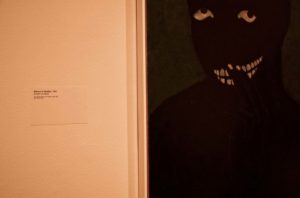A thousand years ago, where were you? A thousand years to come, where would you be? Now, where are you? Answers to these questions generate a fourth question: Are the past and future more important than the present? In other words, in what space can one affect the future and the past? In my current situation, lost in events like work and its fatigue, I am needing motivation and energy to mend my toiling self-discipline, to fight to set myself free from drama binges and a serious milk tea addiction, and to not give into a now stronger fear of getting hurt––now you know my new year resolutions. But the biggest daymare I am experiencing is the challenge of practicing presence. Therefore––let me sound like a textbook please!––I’m glad to start the new year on the blog with the sixth letter of C. S. Lewis’s Screwtape Letters which recommends pain & presence. Stop salivating so grossly, you masochist!

In his sixth letter, Good ol’ Wormwood explains to his young nephew what the Enemy (God) and Our Father Below (Lucifer) would want of his patient in the circumstances of uncertainty, fears and hopes for the future:
My dear Wormwood,
I am delighted to hear that your patient’s age and profession make it possible, but by no means certain, that he will be called up for military service. We want him to be in the maximum uncertainty, so that his mind will be filled with contradictory pictures of the future, every one of which arouses hope or fear. There is nothing like suspense and anxiety for barricading a human’s mind against the Enemy. He wants men to be concerned with what they do; our business is to keep them thinking about what will happen to them. 25
Ah, the joys of uncertainty! When you want something oh-so-badly and you have to wait not knowing whether the thing shall be yours to forget two seconds after it is in your possession or that it will never ever be yours––thus the ruination of your entire life. I burned in this fire for a couple of days during the early stage of the pandemic when I was not sure if I would be able to keep a position at an organization I loved working at. After tossing-sweating-tossing through many a sleepless night, and suffering horrid gut wrenching fear that generated stomach upsets and loss of appetite, the management of the institution finally reached out to give me the boot. The moment hope was lost, a beautiful feeling of calmness overtook me.
Excuse me, but I must share with you a new observation: age and profession are very scary things. Around the age of twenty-five many of us become senile. Oh disagree if you want, but answer this: are you braver after twenty-five or less so? Actually how brave are you after the age of twelve? Do you get braver or closer to becoming a canned chicken? Well, I am at present a canned chicken so excuse me if you are not. Then there is the profession thing: wanting to be recognized in your field. Wanting to make some impact, wanting to make some money so you can go live alone in some forest and be able to afford having some poor immigrant motorcycle your food to you, still pipping hot.
As much as I despise uncertainty, I also love not knowing. So how to overcome the feverish grips of uncertainty with the love of the unknown? Didn’t Buddha say something on this matter? But what is Lewis suggesting? That one ought to eliminate both hope and fear? That one ought not desire anything badly nor badly fear to lose anything? A talisman against the arrows of suspense and anxiety? Now, how to do this? Well, Lewis has more to say on the subject:
Your patient will, of course, have picked up the notion that he must submit with patience to the enemy’s will. What the Enemy means by this is primarily that he should accept with patience the tribulation which has actually been dealt out to him––the present anxiety and suspense. It is about this that he is to say ‘Thy will be done,’ and for the daily task of bearing this that the daily bread will be provided . It is your business to see that the patient never thinks of the present fear as his appointed cross, but only of things he is afraid of. Let him regard them as his crosses: let him forget that, since they are incompatible, they cannot all happen to him, and let him try to practice fortitude and patience to them all in advance. For real resignation, at the same moment, to a dozen different and hypothetical fates, is almost impossible. 25-26
The first thing a healthy human does in life is cry, no? If you don’t cry when you are born it usually means something is the matter with you. In other words, the first feeling one suffers in life is discomfort. So how come we never learn to live with discomfort? How come we spend so much more energy trying to achieve the impossible, live a discomfort-free life? That the present determines both the past and the future means the only state of opportunity is the present. The fishes you are hoping to catch may be sharks and the past you are hanged over allows you to achieve more unappealing pasts. That job I wanted so badly to keep, that the anticipation of being laid off from, made me sick? Well they invited me to work with them again and when I went back to them I realized I must quickly run away and never look back. And it makes sense. Those who would not be friends to you when you are in need are still not your friends when you are no longer in need.
It seems to me that living really means not being distracted from presence by other possibilities. To eat breakfast and not think about lunch but to really savor your oats. To enjoy your sleep and not worry about waking up to go to work but be grateful to have a roof and a cozy enough of a bed and pillow to soak with drool. To remember you love your brother while you are quarreling with him and not say all the terrible things you know would really pull the ground from under him. To learn your grammar properly from the very onset so you will embarrass yourself less in the future! Ah may I remember to chant the Lord’s prayer when the arrows of anticipation and anxiety start shooting at me!
Let’s tackle one more quote before I return to my drama binges, shall we:
One can therefore formulate the general rule; in all activities of mind which favor our cause, encourage the patient to be unself-conscious and to concentrate on the object, but in all activities favorable to the Enemy bend his mind back on itself. Let an insult or a woman’s body so fix his attention outward that he does not reflect ‘I am now entering in the the state called Anger––or the state called Lust.’ Contrariwise let the reflection ‘My feelings are now growing more devout, or more charitable’ so fix his attention inward that he no longer looks beyond himself to see our Enemy or his own neighbours. 26-27
Of course, one is not one’s emotions. Everyone is saying that now, no? I like to think, though, that one is indeed one’s actions. When one acts out a thought or feeling, one becomes the thought/feeling. Also what I am not hearing a lot on, which Lewis is highlighting in the above quote, is the caution one must practice with one’s ego.
On certain days when I have enjoyed too many cups of milk tea––a pressing reason why I must give it up; oh but it is sooo delicious!––I hear my ego singing its own praise: ‘Oh how great you are, Jane! Oh how cool you are, Jane! Oh How talented you are, Jane! Oh how special you are, Jane! Oh how wise you are, Jane!’ Then a part of my conscience would scoff and say something like, ‘If you were so great how come you can’t even quit milk tea or the awful drama binges that are hurting you? If you were so wise, how come you are using the present to upset your future and create a past you might just regret?’ Then I sober up for two seconds. But my ego, so persistent and probably high on sugar, would come up with wonderful excuses and before I know it the self-praise song is even more ridiculous than previous. But this is what happens when you are a canned chicken. You live chickens don’t know how good you’ve got it going. Hump!
I suppose Lewis is saying in the sixth letter of The Screwtape Letters that presence is the essential ingredient in mindfulness, an active talisman to generate harmonious tides within the self and environment. A state necessary to meditate on the Perfect Whole, to create a past of little regret and prepare patiently for an adventurous future. With presence, an insult from someone comes to you as cries from their own wounds: the arrows of their anticipations and anxieties. My ego’s self-praise songs are like the drunken bleats of a silly goat and thus I have reached another opinion: I must be responsible with my inner animal.
Cheers to a mindful year,
J. A. Odartey
+ Lewis, C. S. The Screwtape Letters: Letters from a Senior to a Junior Devil. London: William Collins, 2016. Print.


